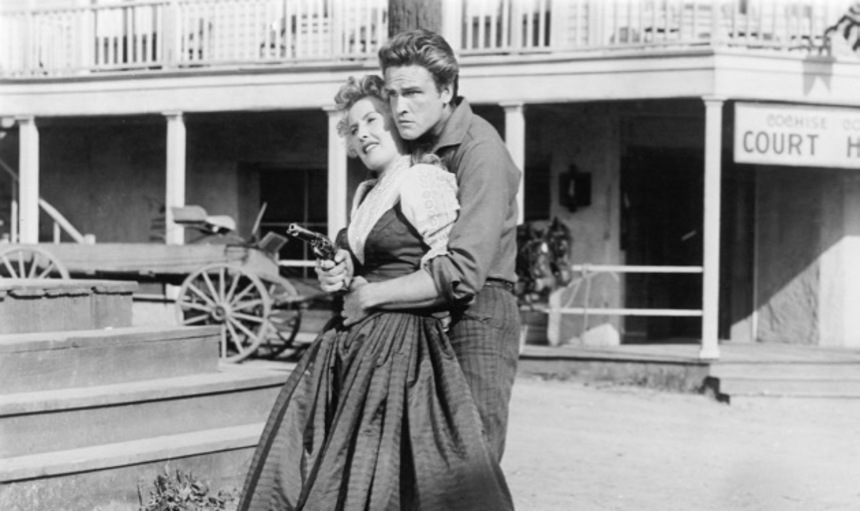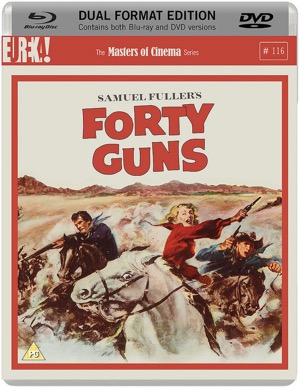Learning From The Masters Of Cinema: Samuel Fuller's FORTY GUNS

Known primarily for his war films and crime dramas, American director Samuel Fuller also directed a quartet of westerns, the last of which being 1957's Forty Guns. The film was part of a deal struck with 20th Century Fox after the success of Fuller's breakout film, about the Korean War, The Steel Helmet. Wooed by the studio's dedication to making "better movies" rather than lining their own pockets, Fuller signed a seven-picture deal.
Forty Guns is loosely based on Wyatt Earp and the iconic "gunfight at the O.K. Corral", which went down in Tombstone, Arizona in October 1881. Here, the Earp surrogate is Griff Bonnell (Barry Sullivan), who rides into town with his two younger brothers, Wes (Gene Barry) and Chico (Robert Dix), with a warrant from the Attorney General. Their target is Howard Swain, one of two score hired guns in the service of local landowner Jessica Drummond (Barbara Stanwyck). When Drummond's brother Brockie (John Ericson) shoots the town Marshal, an old friend of Griff's, the Bonnell brothers vow to stay and clean up Tombstone.
In Forty Guns, Barbara Stanwyck is more mob boss than femme fatale, while the film plays out more like a film noir than a more typical western. Drummond uses her wealth to essentially run the town of Tombstone and keep her marauding gang of drunks and gunslingers out of jail. Seemingly cold-hearted and immune to lust, Drummond eventually falls for Griff after they are caught in a sandstorm, and her emotions compromise her priorities. Fuller fills these encounters with plenty of ribald innuendo about Griff's gun, and Drummond's desire to handle it.
There are many aspects of Forty Guns that feel strange and unfamiliar, even as the story plays out in a mostly familiar fashion. Fuller shot in black and white Cinemascope, and captures a real sense of the vastness of the great outdoors, and his characters' vulnerability to it. However, he also uses a number of extra tight close ups, particularly in Griff's first stand-off with Brockie. For an American western of the period, Fuller's frequent juxtapositions between extreme wide shots and close-ups would seem strange. Of course, Sergio Leone would go on to use them extensively in his spaghetti westerns a few years later.
There is also a complex geometry and inventiveness to the way Fuller stages his shoot outs. Even when the characters are facing off against each other in the traditional manner, the way Fuller frames and edits these encounters feels unsettling and intrusive. His film is also incredibly violent, not so much graphically as emotionally, as victims are seen to suffer at the hands of antagonists who lash out unpredictably in ways which also seem at odds with the traditional melodious rhythms of the western.

As Fuller explains in his 1969 interview at the NFT in London - which Eureka Entertainment includes on its new Masters of Cinema release - the film's ending was changed dramatically at the studio's behest, much to the chagrin of the writer-director and his stars. In Fuller's original script, Griff shoots and kills Jess, who Brockie is using as a human shield, so he can then gun down the villain. Fox absolutely refused to release this version of the film, so Fuller was forced to shoot the new, more hopeful ending that we see here. If only Fuller had been allowed to retain the film's original title "Woman with a Whip", which at least remains as a lyric in Jidge Carroll's theme song.
Despite its rather formulaic narrative, Forty Guns is rich with imagery, emotion and a rawness that has the ability to shock even 21st century audiences. He displays numerous visual and aural flourishes - filming down the barrel of a gun to accentuate Wes' lust for Eve Brent's sexy gunsmith; the banging of a hanged suitor interrupting Griff and his new lover's embrace - which show Fuller up to be a filmmaker way ahead of his time.
A newsman by trade before moving into filmmaking, Fuller has been labelled a peddler of "tabloid filmmaking" for his exploitative style, but it is precisely this edgy unpredictability and refusal to play by the rules that keeps him relevant and exciting to this day. In the disc's other major supplement, French critic Jean-Louis Leutrat illustrates numerous instances where Fuller's work - in Forty Guns specifically - influenced not only Leone, but also the films of Jean-Luc Godard and Clint Eastwood.
Even with its compromised finale, Forty Guns has a moody, discomforting air of impending doom hanging over it, fuelled by the fact it is populated almost entirely by flawed or downright dastardly characters. There are glimmers of hope for humanity in the town of Tombstone, however, in the form of young Chico Bonnell, for whom this proves something of a coming-of-age tale, and perhaps Brent's Louvenia, despite the tragedy she must endure. It is perhaps difficult to picture an idyllic future for Griff and Jess together in California, but Forty Guns nevertheless proves a fittingly uncompromising send off for Fuller's wild west.
Masters of Cinema delivers Forty Guns in a dual format Blu-ray/DVD release, featuring the aforementioned supplements. An audio recording of an on-stage interview with Samuel Fuller recorded at the National Film Theatre in London in 1969 is presented on the disc as an alternative audio track to the film. The disc also includes a fascinating video interview with French critic Jean-Louis Leutrat about the film, and we get the original theatrical trailer too. The accompanying booklet (which was not available for review), includes new writing from Stephane Joudet, an extract from Sam Fuller's autobiography and rare archival imagery. All in all a respectful package for one of Fuller's minor, but certainly still interesting works, which should please aficionados of the man and his enduring gifts to American cinema.
Forty Guns is available on dual format Blu-ray/DVD from Eureka Entertainment's Masters of Cinema series in the UK now.

Do you feel this content is inappropriate or infringes upon your rights? Click here to report it, or see our DMCA policy.






